

"Can't I Just Choose My Own Topic?" So many times as an English and history teacher, I've rushed students through the first step of the research process: choosing a topic.
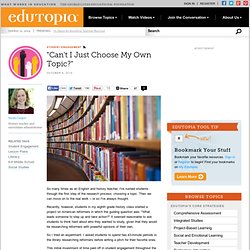
Then we can move on to the real work -- or so I've always thought. Recently, however, students in my eighth grade history class started a project on American reformers in which the guiding question was: "What leads someone to step up and take action? " Why Sleeping May Be More Important Than Studying. Getty Getting enough sleep is an under-valued but crucial part of learning.
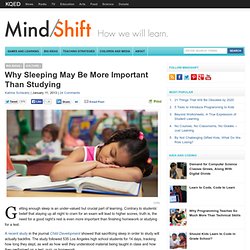
Contrary to students’ belief that staying up all night to cram for an exam will lead to higher scores, truth is, the need for a good night’s rest is even more important than finishing homework or studying for a test. A recent study in the journal Child Development showed that sacrificing sleep in order to study will actually backfire. The study followed 535 Los Angeles high school students for 14 days, tracking how long they slept, as well as how well they understood material being taught in class and how they performed on a test, quiz, or homework. “Although the researchers expected that extra hours of studying that ate into sleep time might create problems in terms of students’ understanding of what they were taught in class, they were surprised to find that diminishing sleep in order to study was actually associated with doing more poorly on a test, quiz, or homework,” Science Daily wrote.
Academic Sponge Activities. Pondering education, technology, and making a difference. Life in a Inquiry Driven, Technology-Embedded, Connected Classroom: English. Disciplined Rebellion. EdTechCHAT. How Does the Brain Learn Best? Smart Studying Strategies. First female to win math's top prize describes her 2 brainstorming strategies. Iranian-born Maryam Mirzakhani of Stanford University has become the first woman to win the top award in mathematics, the Field’s Medal.
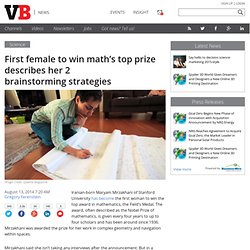
The award, often described as the Nobel Prize of mathematics, is given every four years to up to four scholars and has been around since 1936. Mirzakhani was awarded the prize for her work in complex geometry and navigation within spaces. Mirzakhani said she isn’t taking any interviews after the announcement. For Storytelling Projects, Cool New Multimedia Tools. Paul Salopek and Ahmed Kabil Writing will always be important, but weaving text, images, sound, and presentation together can give students more and different ways to express themselves.
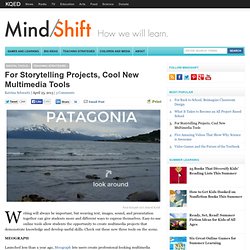
Easy-to-use online tools allow students the opportunity to create multimedia projects that demonstrate knowledge and develop useful skills. Check out these new three tools on the scene. Glenn Beck Is So Fascinated by This Author’s Ideas He Spent the Full Three Hours of His Radio Broadcast With Him. Glenn Beck on Tuesday spent the full three hours of his radio broadcast with author Simon Sinek, saying he believes the man’s ideas are truly “life-changing.”

Beck jokingly refers to Sinek, the author of “Start with Why: How Great Leaders Inspire Everyone to Take Action” and “Leaders Eat Last: Why Some Teams Pull Together and Others Don’t,” as the “why guy.” When asked to explain his philosophy, Sinek began: “Every single organization on the planet, even our own careers, always function on three levels: what we do, how we do it, and why we do it.” Author Simon Sinek speaks on Glenn Beck’s radio program July 29, 2014. How to Teach the Standards Without Becoming Standardized. Is it possible for teachers to meet standards without teaching in a standardized way?
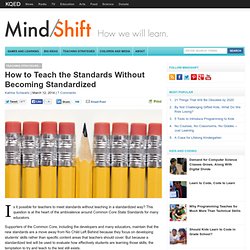
This question is at the heart of the ambivalence around Common Core State Standards for many educators. Supporters of the Common Core, including the developers and many educators, maintain that the new standards are a move away from No Child Left Behind because they focus on developing students’ skills rather than specific content areas that teachers should cover. But because a standardized test will be used to evaluate how effectively students are learning those skills, the temptation to try and teach to the test still exists. Educators say they’re already feeling pressure from administrators to teach the same things at the same time in an attempt to ensure strong test results.
“It certainly isn’t how you inspire teachers to stay in the classroom,” said veteran teacher Diana Laufenberg at EduCon conference hosted by Science Leadership Academy in Philadelphia. Mastering the Teaching Game. Recently, I heard Sven Groeneveld being interviewed on my car radio.
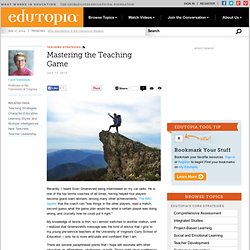
He is one of the top tennis coaches of all times, having helped four players become grand slam winners, among many other achievements. The BBC reports that the coach can "see things in the other players, read a match, second guess what the game plan would be, what a certain player was doing wrong, and crucially how he could put it right. " UnGoogleable Questions in the classroom. A first step. One of the major challenges I’m facing at the moment with my Middle years class is the fact that they’re still learning how to research properly.
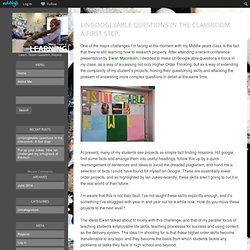
After attending a recent conference presentation by Ewan Macintosh, I decided to make UnGoogle-able questions a focus in my class, as a way of accessing not only Higher Order Thinking, but as a way of extending the complexity of my student’s projects, honing their questioning skills and attacking the problem of answering more complex questions in detail at the same time. At present, many of my students see projects as simple fact finding missions. Hit google, find some facts and arrange them into useful headings, follow this up by a quick rearrangement of sentences and ideas to avoid the dreaded plagiarism, and hand me a selection of facts I could have found for myself on Google.
These are essentially lower order projects, and as highlighted by Ian Jukes recently, these skills aren’t going to cut it in the real world of their future. UnGoogleable Questions in the classroom. A first step. How to Tie 7 Basic Knots. 7 Letters to Write Before You Turn 70. Simon Sinek: Why good leaders make you feel safe. Warrior Spirit. Ending on an Upswing. The end of the school year is quickly drawing closer, and the kids are starting to stare outside longingly.
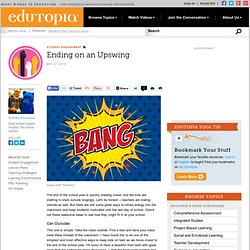
How Opening Up Classroom Doors Can Push Education Forward. Transparency is not a word often associated with education.
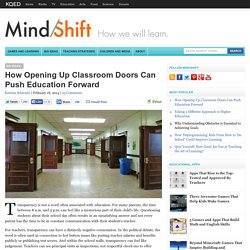
For many parents, the time between 8 a.m. and 3 p.m. can feel like a mysterious part of their child’s life. Questioning students about their school day often results in an unsatisfying answer and not every parent has the time to be in constant communication with their student’s teacher. For teachers, transparency can have a distinctly negative connotation. In the political debate, the word is often used in connection to hot button issues like posting teacher salaries and benefits publicly or publishing test scores. For Students, Why the Question is More Important Than the Answer. Thinkstock In a traditional classroom, the teacher is the center of attention, the owner of knowledge and information. Teachers often ask questions of their students to gauge comprehension, but it’s a passive model that relies on students to absorb information they need to reproduce on tests.
What would happen if the roles were flipped and students asked the questions? Teach Students to Ask Their Own Questions. This process explicitly validates all students’ intellectual abilities.– High School History Teacher, New York The reasons behind their questions often bowl me over with their sincerity, the fact that [they] really want to know the answers because it’s important to them, or they feel it would be important for others to know.– 4th Grade Teacher, Chicago The ability to produce questions, improve questions and prioritize questions may be one of the most important—yet too often overlooked—skills that a student can acquire in their formal education. Strong critical thinking is often grounded in the questions we ask. By deliberately teaching questioning skills, we will be facilitating a process that will help students develop a mental muscle necessary for deeper learning, creativity and innovation, analysis, and problem solving.
5 Powerful Questions Teachers Can Ask Students. My first year teaching a literacy coach came to observe my classroom. For Educators, the Importance of Making Meaningful Connections. Culture. Three Things to Unlearn About Learning. Inquiry Learning Teaching Strategies. Don’t Lecture Me: Rethinking How College Students Learn. Why Kids Need Schools to Change. Big Ideas. To Advance Education, We Must First Reimagine Society. Why haven’t education reform efforts amounted to much?
Why is my kid allowed to make spelling mistakes? - Cult of Pedagogy. Dear Cult of Pedagogy, Can Kids Be Taught Persistence? Culture Teaching Strategies. Infographics Kit - Home. Infographics. Confessions of a Crafty Middle School Teacher. How to Reinvent Project Based Learning to Be More Meaningful. FlippedPD. Evernote Notebook. Evernote for Educators Workshop by Rob Zdrojewski. Teaching Ahead: A Roundtable - Do Teachers Need More ‘Grit’? Archives. Beyond the Comfort Zone: 6 Ways to Build Independent Thinking. Blog. Teachers: Staying Positive in Trying Times. 3 Ways to Make Meaningful Connections with Your Students. 6 Steps to Help Students Find Order in Their Thinking. Beyond Knowing Facts, How Do We Get to a Deeper Level of Learning?
Tech Tools. Student Motivation. Top 10 Posts of 2012: Deep, Meaningful and Creative Learning. What Does ‘Design Thinking’ Look Like in School?